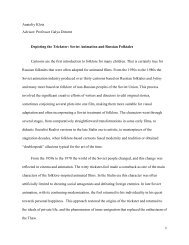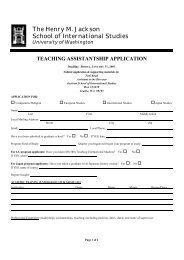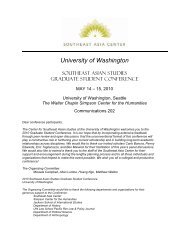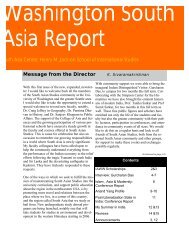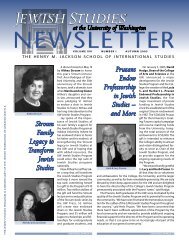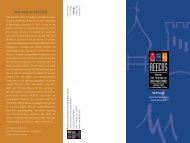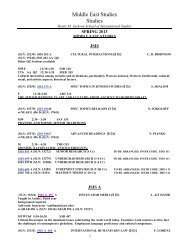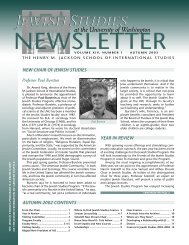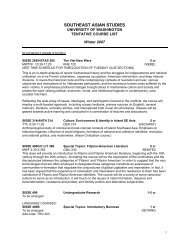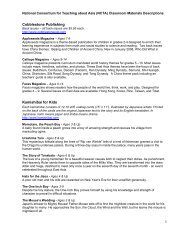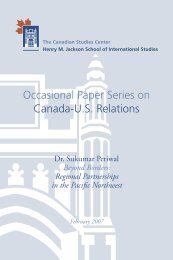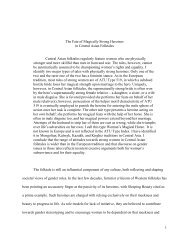JSIS STUDENT SERVICES - Jackson School of International ...
JSIS STUDENT SERVICES - Jackson School of International ...
JSIS STUDENT SERVICES - Jackson School of International ...
Create successful ePaper yourself
Turn your PDF publications into a flip-book with our unique Google optimized e-Paper software.
Page 2<br />
<strong>STUDENT</strong> <strong>SERVICES</strong> BULLETIN<br />
Panagariya <strong>of</strong> Columbia University stressed that India is not a rising power as so many suggest, but an already risen power that is<br />
back on the U.S. agenda. By his calculations, India will be the 3 rd largest economy in 2025. Although optimistic, he realizes that the<br />
education system needs to be fixed in order to take advantage <strong>of</strong> this growth. Bringing a historical perspective to the relationship<br />
between India and China, Anand Yang, pr<strong>of</strong>essor <strong>of</strong> <strong>International</strong> Studies and History at the University <strong>of</strong> Washington, spoke<br />
<strong>of</strong> the current state <strong>of</strong> affairs as India and China rise again. Although their past has been tumultuous, he noted that increasingly,<br />
their relations are beginning to change and their economies complement each other, which has huge implications for the United<br />
States and the rest <strong>of</strong> the world. Lastly, Sunila Kale, assistant pr<strong>of</strong>essor <strong>of</strong> international studies at the University <strong>of</strong> Washington,<br />
analyzed the political, social, and economic differences between Indian states, demonstrating that poverty, over-population, and<br />
illiteracy are focused in the north-east regions <strong>of</strong> the country. She concluded that not only does the federal government influence<br />
the states, but each state government has a substantial role and can greatly affect its own economy.<br />
Priti Ramamurthy, pr<strong>of</strong>essor in the Department <strong>of</strong> Gender, Women, and Sexuality Studies and chair <strong>of</strong> the South Asian<br />
Studies Program at the University <strong>of</strong> Washington, introduced Rahul Khullar and Robert Hormats, the plenary speakers. She<br />
delved into the meanings <strong>of</strong> the knowledge economy, explaining how knowledge frames our understanding <strong>of</strong> the world while technology<br />
innovation connects the world and, hopefully, furthers social development. Rahul Khullar, Secretary <strong>of</strong> the Ministry <strong>of</strong> Commerce<br />
and Industry <strong>of</strong> the Government <strong>of</strong> India, expressed a desire to go beyond discussing commerce and trade to bring a perspective<br />
to the conversation that uses knowledge to solve India’s problems. His goal is to build more linkages between universities<br />
and research and government, and he was very candid about new linkages as necessary for economically meaningful outcomes.<br />
He noted many instances <strong>of</strong> greater productivity sparked by cooperation between the United States and India, and challenged the<br />
audience to harness knowledge for social progress. Noting his friendship with Khullar as emblematic <strong>of</strong> the U.S.-India partnership,<br />
Under Secretary Robert D. Hormats <strong>of</strong> the Economic, Energy, and Agricultural Affairs <strong>of</strong>fice <strong>of</strong> the U.S. Department <strong>of</strong> State listed<br />
the many similarities between the two countries and stressed the need to broaden and deepen the economic partnership for mutual<br />
benefit. He stressed India’s need for improved infrastructure, the increased economic linkages between India and its neighbors,<br />
and the need to make the U.S. more welcoming by encouraging quicker processing <strong>of</strong> visas and letting Indians here to study stay in<br />
the United States longer.<br />
The speakers on the second panel focused on technology transfers, intellectual property regimes, and the knowledge-innovation<br />
economy in India, with Deputy Under Secretary <strong>of</strong> Commerce for Intellectual Property and Deputy Director <strong>of</strong> the U.S. Patent and<br />
Trademark Office, Teresa Stanek Rea as the moderator. Dinesh Keskar, President <strong>of</strong> Boeing India and Vice President <strong>of</strong> Boeing<br />
<strong>International</strong> Corporation India Private Limited, presented on the history <strong>of</strong> Boeing, Indian import mandates and how Boeing is investing<br />
these in Indian research and educational institutions.. Director <strong>of</strong> Trade and Competition Policy at Intel Corporation, Greg<br />
Slater, discussed elements for creating an innovation ecosystem with a cycle <strong>of</strong> innovation and investment. He focused on the policy<br />
surrounding intellectual property and how India needs to encourage greater IP protection to stimulate innovation. Ron Somers,<br />
President <strong>of</strong> the U.S.-India Business Council agreed, stressing that innovation takes places when IP is rewarded and protected,<br />
citing the example <strong>of</strong> pharmaceuticals.<br />
With a focus on U.S.-India trade, supply chains, and corporate responsibility, the third panel was moderated by Assistant Secretary<br />
<strong>of</strong> Commerce for Manufacturing and Services in the <strong>International</strong> Trade Administration, Nicole Lamb-Hale, who stressed the need<br />
for improving supply chains. Aseem Prakash, pr<strong>of</strong>essor <strong>of</strong> Political Science and the Walker Family Pr<strong>of</strong>essor for the College<br />
<strong>of</strong> Arts and Sciences at the University <strong>of</strong> Washington, focused on the problems and prospect <strong>of</strong> corporate environmentalism. He<br />
urged the private sector to encourage environmental ethics with collective endeavors through voluntary programs to correct market<br />
and government failure. Sanjeev Khagram, who holds a joint faculty appointment with the <strong>Jackson</strong> <strong>School</strong> <strong>of</strong> <strong>International</strong><br />
Studies and the Evans <strong>School</strong> <strong>of</strong> Public Affairs at the University <strong>of</strong> Washington, looked into new measures being taken by major<br />
multinational corporations to establish sustainable supply chains. He suggested that the governments <strong>of</strong> both countries and universities<br />
should play a role in demanding social regulations through a sustainability consortium. The program is led by companies including<br />
Walmart to create a rating system for products and their life-cycle impact so companies can choose products based on their<br />
sustainability. Priti Ramamurthy discussed the possibilities for pro-poor development in India by the adoption <strong>of</strong> agricultural biotechnologies.<br />
Drawing on her research on the cotton industry in India, especially genetically modified seeds, she detailed why US<br />
commercial interests in agricultural biotechnologies are high and will grow. She concluded that greater investment in technology to<br />
ensure food security is necessary but that assessing their long-term sustainability requires a social understanding <strong>of</strong> their impacts.<br />
The last panel dealt with health science, technologies, commercialization, and U.S.-India partnerships in these fields. Moderator<br />
Katya M. Delak is <strong>International</strong> Affairs Officer in the <strong>International</strong> and Academic Affairs Office at NIST. Pradipsinh K. Rathod, pr<strong>of</strong>essor<br />
<strong>of</strong> Chemistry and adjunct pr<strong>of</strong>essor <strong>of</strong> Global Health at the University <strong>of</strong> Washington, discussed his malaria research<br />
and a new project to set up labs in places without a history <strong>of</strong> malaria research, with a focus on northeast India, which has higher<br />
cases <strong>of</strong> poverty and malnutrition. This will enable researchers at UW to work more closely with those in the field. Adding to the<br />
argument that patent access and IP protection are becoming more important, associate pr<strong>of</strong>essor in the Department <strong>of</strong> Government<br />
at Claremont McKenna College, Aseema Sinha, discussed the intertwined nature <strong>of</strong> US and Indian government policy in the pharmaceutical<br />
sector. She documented how policy regulation in the U.S. and in India, led to the expansion <strong>of</strong> generic medication manufacture<br />
in India, which is reducing health care costs and encouraging research collaboration between countries. Christopher Fox,<br />
the lead formulation engineer for the Infectious Disease Research Institute, discussed a case <strong>of</strong> technology transfer between his<br />
institute and an Indian pharmaceutical company and made policy recommendations such as funding mechanisms, incentives, and<br />
forums to generate new ideas and solutions. Submitted by -- Suzanna Parikh, UW Junior, Business & Conference Intern<br />
A follow-up to this event took place in Seattle on January<br />
10, 2012. Please contact the South Asia Center for<br />
more details. (sascuw@uw.edu; http://jsis.washington.edu/<br />
soasia/ or http://www.seattletradealliance.com/blog/?<br />
p=7014)



